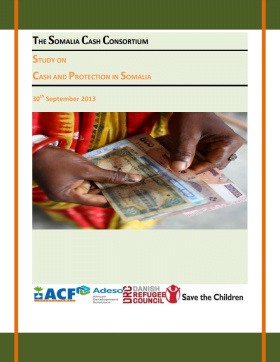Study on Cash and Protection in Somalia
The worst drought to hit Somalia in 60 years happened in 2011 and came to be popularly known as ‘The Horn of Africa Hunger Crisis’. The drought happened in a context of active conflict and a weak government that could neither protect its citizens nor the humanitarian actors. The Somalia Cash Consortium (SCC)1 – comprising four agencies – Danish Refugee Council, ADESO – formerly Horn Relief (HR), Save the Children and Action against Hunger (ACF) International responded through the ‘the Food Assistance to South Central Somalia (FASCS) project’ which targeted vulnerable communities in Lower Juba, Gedo, Mudug, Hiraan and Mogadishu with ‘unconditional Cash transfers’ that would facilitate households to access basic food and non-food items. The consortium was formed solely for the purpose of this humanitarian response. Due to the magnitude of the problem, this was a strategic consideration and a collaborative effort in addressing the emergency given that no single organization would have responded effectively. The consortium implemented one of the biggest unconditional cash transfers in Somalia, covering about 13% of the affected population (79,002 HHs equivalent to 474,793 people) out of the approximately 3.7 million affected people (UN report July 2012)2. Largely the emergency intervention was successful as it saved lives and significantly reduced the number of people affected by the hunger / drought.
During the intervention the protection environment deteriorated further with armed groups fighting the government, imposing ‘no cash delivery to beneficiaries‘, as well as harassing beneficiary en-route to and from cash collection centres. In Hiraan for example, militia activities necessitated temporary suspension of the project activities in Feb / March 2012. The consortium also commissioned various studies3 to look into the various emerging strategic issues. This particular study researched on protection issues linked to the cash based interventions.
